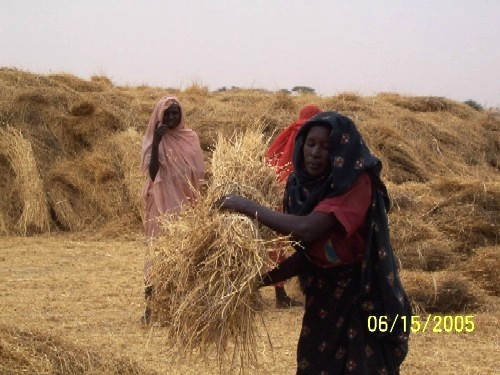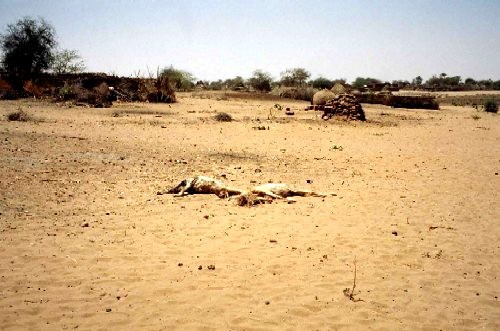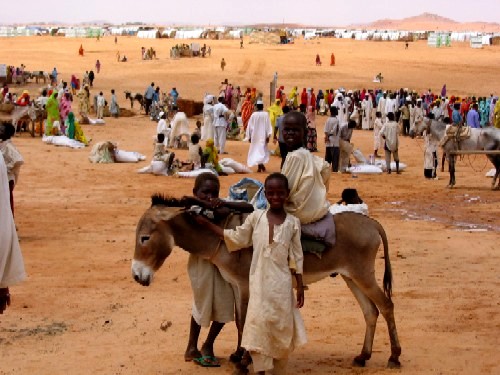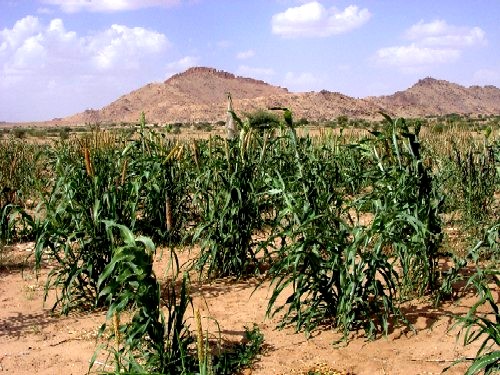Navigation
Around 70 000 farming families receive seeds and tools in North Darfur
The rainy season has just begun in North Darfur, and around 70 000 vulnerable rural families will be able to plant with seeds and agricultural tools provided by FAO, the UN agency said today.
20 July 2005, Rome - The rainy season has just begun in North Darfur, and around 70 000 vulnerable rural families will be able to plant with seeds and agricultural tools provided by FAO, the UN agency said today.
Some 550 tonnes of field crop seeds, including millet, sorghum and groundnut, and around 79 000 tools, including hand tools and donkey ploughs, were distributed outside displacement camps to conflict-affected households, but also to households in host communities to encourage people to stay on their land. The assistance will help these families produce enough food to feed themselves for almost three months.
 |
| Women collect fodder in North Darfur, Sudan.FAO Photo |
Conflict, drought and failed harvests
There has been tension in Darfur for many years over land and grazing rights, however, after two years of conflict, drought and failed harvests, very few farmers in North Darfur have seeds to plant. The seeds that are available are not enough to cultivate even a third of the area that was under crops before the conflict.
"This is the third agriculture season missed by farmers," says Bashir Abdel Rahman, FAO Agriculture Field Officer in North Darfur. "Seeds were looted, lost during the escape to displaced persons camps, eaten or simply damaged due to improper storage. The harvest for the last two years was poor because of displacement, insecurity and erratic and below average rainfall."
Most of the population of North Darfur are dependant on locally produced grain for food. Last year's harvest met only 15 percent of the region's food needs, thus increasing the caseload for the already protracted food aid distributions.
 |
| Conflict, drought and failed harvests have taken their toll on human and livestock populations in Darfur. FAO Photo |
Rebuilding rural livelihoods
Delivering seeds to farmers outside the displacement camps gives them the opportunity to produce food for their families and to generate needed cash income to re-establish their livelihoods. Helping farmers stay on their land and preventing further displacement into camps is key to the FAO-supported household food security activities in Darfur.
The cash generated from agricultural activities will support children's education and health care and allow the purchase of essential goods and services such as clothes, mats, oil and sugar. Secondary markets that have been inactive because of insufficient grain supplies can be revived, revitalizing the local economy.
In the whole of Darfur, more than 100 000 households will receive crop seeds and other assistance from FAO this agricultural season.
 |
| Boys pose with their donkey at the Abu Shouk displacement camp. FAO Photo |
"FAO could achieve better results with more funding," says Sara McHattie, North Darfur Area Emergency Coordinator. "For one tenth of what is spent on food aid for a month, enough seeds can be purchased to help the same number of people produce their own food for several months."
FAO also supports communities with livestock programmes including camp-based veterinary interventions, donkey feeding programmes, poultry stocking, training of community animal health workers and pasture land restoration.
By addressing food security needs through adequate livelihoods support, FAO provides families and communities with assistance to restart farming and pastoral activities, providing a cost-effective, life-saving intervention and promoting self-reliance and an early exit from food aid.
 |
| Early maturing millet being grown as part of an FAO seed multiplication project in Darfur. FAO Photo |
More than twice as many households still need assistance
In response to its appeal for $15 million for Darfur for 2005, FAO has received around $7 million to date, or approximately 45 percent of its funding needs. Receipt of the remaining funding would allow FAO and its implementing partners to assist an additional 100 000 families with agricultural and livestock supplies in the three Darfur states.
Contact:
Teresa Buerkle
Information Officer, FAO
teresamarie.buerkle@fao.org
(+39) 06 570 56146
(+39) 348 14 16 671 (mobile)
Related links
- Emergency relief and rehabilitation at FAO
http://www.fao.org/reliefoperations/en/index.html - Country profile: Sudan
http://www.fao.org/countryprofiles/index.asp?lang=en&ISO3=SDN - Supporting the peace process in Sudan
http://www.fao.org/newsroom/en/news/2005/102620/index.html
VIDEO:
- Scorched Earth: FAO in Sudan
ftp://ext-ftp.fao.org/video/2572-Sudan-e.mpeg
The FAO is solely responsible for the contents of this press release.
Search
Latest articles
Agriculture
- World Water Week: Healthy ecosystems essential to human health: from coronavirus to malnutrition Online session Wednesday 24 August 17:00-18:20
- World Water Week: Healthy ecosystems essential to human health: from coronavirus to malnutrition Online session Wednesday 24 August 17:00-18:20
Air Pollution
- "Water and Sanitation-Related Diseases and the Changing Environment: Challenges, Interventions, and Preventive Measures" Volume 2 Is Now Available
- Global Innovation Exchange Co-Created by Horizon International, USAID, Bill and Melinda Gates Foundation and Others
Biodiversity
- It is time for international mobilization against climate change
- World Water Week: Healthy ecosystems essential to human health: from coronavirus to malnutrition Online session Wednesday 24 August 17:00-18:20
Desertification
- World Water Week: Healthy ecosystems essential to human health: from coronavirus to malnutrition Online session Wednesday 24 August 17:00-18:20
- UN Food Systems Summit Receives Over 1,200 Ideas to Help Meet Sustainable Development Goals
Endangered Species
- Mangrove Action Project Collaborates to Restore and Preserve Mangrove Ecosystems
- Coral Research in Palau offers a “Glimmer of Hope”
Energy
- Global Innovation Exchange Co-Created by Horizon International, USAID, Bill and Melinda Gates Foundation and Others
- Wildlife Preservation in Southeast Nova Scotia
Exhibits
- Global Innovation Exchange Co-Created by Horizon International, USAID, Bill and Melinda Gates Foundation and Others
- Coral Reefs
Forests
- NASA Satellites Reveal Major Shifts in Global Freshwater Updated June 2020
- Global Innovation Exchange Co-Created by Horizon International, USAID, Bill and Melinda Gates Foundation and Others
Global Climate Change
- It is time for international mobilization against climate change
- It is time for international mobilization against climate change
Global Health
- World Water Week: Healthy ecosystems essential to human health: from coronavirus to malnutrition Online session Wednesday 24 August 17:00-18:20
- More than 400 schoolgirls, family and teachers rescued from Afghanistan by small coalition
Industry
- "Water and Sanitation-Related Diseases and the Changing Environment: Challenges, Interventions, and Preventive Measures" Volume 2 Is Now Available
- Global Innovation Exchange Co-Created by Horizon International, USAID, Bill and Melinda Gates Foundation and Others
Natural Disaster Relief
- STOP ATTACKS ON HEALTH CARE IN UKRAINE
- Global Innovation Exchange Co-Created by Horizon International, USAID, Bill and Melinda Gates Foundation and Others
News and Special Reports
- World Water Week: Healthy ecosystems essential to human health: from coronavirus to malnutrition Online session Wednesday 24 August 17:00-18:20
- STOP ATTACKS ON HEALTH CARE IN UKRAINE
Oceans, Coral Reefs
- World Water Week: Healthy ecosystems essential to human health: from coronavirus to malnutrition Online session Wednesday 24 August 17:00-18:20
- Mangrove Action Project Collaborates to Restore and Preserve Mangrove Ecosystems
Pollution
- Zakaria Ouedraogo of Burkina Faso Produces Film “Nzoue Fiyen: Water Not Drinkable”
- "Water and Sanitation-Related Diseases and the Changing Environment: Challenges, Interventions, and Preventive Measures" Volume 2 Is Now Available
Population
- "Water and Sanitation-Related Diseases and the Changing Environment: Challenges, Interventions, and Preventive Measures" Volume 2 Is Now Available
- "Water and Sanitation-Related Diseases and the Changing Environment: Challenges, Interventions, and Preventive Measures" Volume 2 Is Now Available
Public Health
- Honouring the visionary behind India’s sanitation revolution
- Honouring the visionary behind India’s sanitation revolution
Rivers
- World Water Week: Healthy ecosystems essential to human health: from coronavirus to malnutrition Online session Wednesday 24 August 17:00-18:20
- Mangrove Action Project Collaborates to Restore and Preserve Mangrove Ecosystems
Sanitation
- Honouring the visionary behind India’s sanitation revolution
- Honouring the visionary behind India’s sanitation revolution
Toxic Chemicals
- "Water and Sanitation-Related Diseases and the Changing Environment: Challenges, Interventions, and Preventive Measures" Volume 2 Is Now Available
- Actions to Prevent Polluted Drinking Water in the United States
Transportation
- "Water and Sanitation-Related Diseases and the Changing Environment: Challenges, Interventions, and Preventive Measures" Volume 2 Is Now Available
- Urbanization Provides Opportunities for Transition to a Green Economy, Says New Report
Waste Management
- Honouring the visionary behind India’s sanitation revolution
- Honouring the visionary behind India’s sanitation revolution
Water
- Honouring the visionary behind India’s sanitation revolution
- Honouring the visionary behind India’s sanitation revolution
Water and Sanitation
- Honouring the visionary behind India’s sanitation revolution
- Honouring the visionary behind India’s sanitation revolution

